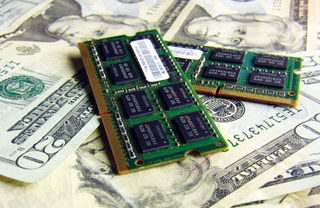Elpida Bankruptcy to Increase DRAM Prices, Say Analysts
Expect the bankruptcy filing of Elpida to result in higher prices for DRAM in the second half of the year.

With Elpida's plunge into bankruptcy protection, market research firm IHS estimates that prices for memory will increase by about 15.5 percent if more than 25 percent of Elpida's production volume disappears. By the end of 2012, the average DRAM chip could cost $1.21, up from $1.05 in the first half of the year. If the production remains intact, prices are forecast to increase to only $1.13.
“A meaningful reduction in Elpida’s manufacturing will cause the DRAM market to go into a state of undersupply, causing prices to increase,” said Mike Howard, senior principal analyst at IHS. “Shipments likely will decrease because of the Elpida bankruptcy, even though the resulting increase in revenue, driven by higher prices, will cause the market to perform better than expected in 2012."
Howard said that the bankruptcy alone, however, means that "DRAM players can look forward to a much rosier 2012 than they did just one week ago." As a result, the market research firm has increased its DRAM revenue prediction for 2012 from $24 billion to $30 billion.
While the fate of Elpida is uncertain at this time, the analyst noted that the chronically oversaturated DRAM industry may finally reach a state of supply/demand equilibrium.” Such a scenario could provide much more stable pricing for all DRAM makers. In the short term, IHS believes that Micron and Nanya will benefit the most from a possible supply shortage and gain market share as DRAM buyers are looking for supply alternatives. As the two dominant DRAM manufacturers, Hynix and Samsung are likely to already provide DRAMs to most major companies.
Stay on the Cutting Edge
Join the experts who read Tom's Hardware for the inside track on enthusiast PC tech news — and have for over 25 years. We'll send breaking news and in-depth reviews of CPUs, GPUs, AI, maker hardware and more straight to your inbox.
-
hixbot If the higher prices will invrease overall revenue, then they are increasing prices too much.Reply -
billybobser got 8 gigs is current setup, not set to change for 5 years I reckon given that I'll be migrating ivy/sandy next year and their lack of reliance on ram.Reply
Ram has been sold purely on marketting and fancy numbers and rarely on performance. I imagine people's choices have been more swayed on colour than on benchies. Prices go up, and people will stop buying (as they should have enough overfed by now) or go for the cheaper options.
-
digiex After the hard disk price hike, another computer part going up, hope it will not happen.Reply -
Unlimited1980 The prices are still down & cheap.Reply
So just don't waist time and buy all the RAM, that you think, you will nedd in the comin 2 Year 'till DDR4 is rouling the market (starting 2013, roaring 2014). -
DRosencraft Wasn't there an article just a few weeks ago claiming that DRAM manufacturers were going to start ramping production back up again becuase they had reached the supply/demand equilibrium? It may be my lack of understanding of the intricacies of markets and what not, but don't you price your products based on the cost you incur making them? In other words, if you make a million chips last quarter, but only sell 3/4 of a million, don't you just make 3/4 of a million the next quarter, using the left over 1/4 of a million from before as oversupply in case of a production miss this quarter?Reply
I don't understand why these memory chip makers are having so much trouble figuring out how many chips they need to make. I really can't think of another industry that has had so much trouble for so long figuring out their supply/demand structure. I meanm, Elpidia is a huge name in memory. There's no reason it should have gone bankrupt. It sounds to me like they got greedy, tried to push up production thinking they would certainly be able to sell all of it and make a huge profit, assuming the market saturation wouldn't catch up to them.
Most Popular

